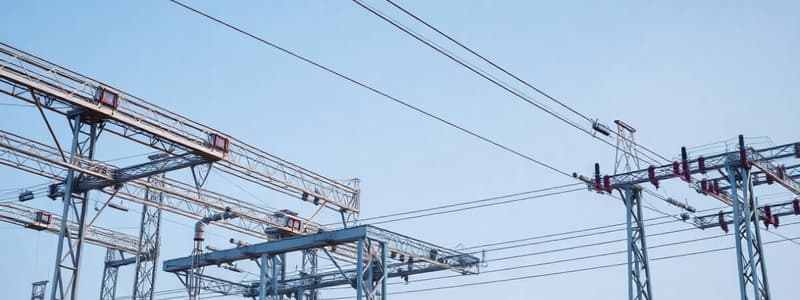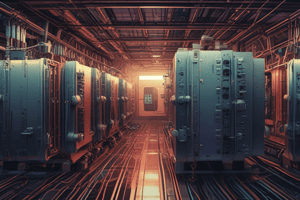Podcast
Questions and Answers
What is a key advantage of using three-phase electrical systems compared to single-phase systems?
What is a key advantage of using three-phase electrical systems compared to single-phase systems?
- They require more wiring to function.
- They are less efficient in power transfer.
- They are easier to install and maintain.
- They provide a more constant power flow. (correct)
What is the typical electrical phase difference in a three-phase electrical system?
What is the typical electrical phase difference in a three-phase electrical system?
- 120 degrees (correct)
- 180 degrees
- 360 degrees
- 90 degrees
Which of the following best describes commercial solar systems?
Which of the following best describes commercial solar systems?
- They typically involve more extensive infrastructure than residential systems. (correct)
- They do not require any special permits or inspections.
- They solely provide electricity for off-grid applications.
- They are designed for individual homes only.
Which factor is important in the design of commercial solar systems?
Which factor is important in the design of commercial solar systems?
What is primarily required for off-grid commercial solar applications?
What is primarily required for off-grid commercial solar applications?
How does the efficiency and cost of solar panels vary?
How does the efficiency and cost of solar panels vary?
In a three-phase electrical system, what component is essential for providing protection against electrical shock?
In a three-phase electrical system, what component is essential for providing protection against electrical shock?
What economic aspect is crucial to consider when planning commercial solar installations?
What economic aspect is crucial to consider when planning commercial solar installations?
Flashcards
Three-Phase Electrical Systems
Three-Phase Electrical Systems
A three-phase electrical system uses three wires to transfer power more efficiently than a single-phase system, resulting in smoother power flow and reduced voltage fluctuations.
Transformer (Three-Phase)
Transformer (Three-Phase)
A key component in a three-phase system, transformers convert voltage levels from one phase to another for efficient power distribution.
Phase Difference (Three-Phase)
Phase Difference (Three-Phase)
The three phases in a three-phase system are shifted 120 degrees apart electrically, allowing for smooth operation of motors and other equipment.
Commercial Solar Systems
Commercial Solar Systems
Signup and view all the flashcards
System Design (Commercial Solar)
System Design (Commercial Solar)
Signup and view all the flashcards
Grid-Tied vs. Off-Grid (Commercial Solar)
Grid-Tied vs. Off-Grid (Commercial Solar)
Signup and view all the flashcards
Economic Analysis (Commercial Solar)
Economic Analysis (Commercial Solar)
Signup and view all the flashcards
Permits and Inspections (Commercial Solar)
Permits and Inspections (Commercial Solar)
Signup and view all the flashcards
Study Notes
Three-Phase Electrical Systems
- Three-phase electrical systems use three wires to transmit power, more efficiently than single-phase.
- This setup delivers a consistent power flow, minimizing voltage fluctuations.
- Key components include transformers, generators, and motors.
- Three-phase systems suit industrial settings due to their high-power handling capabilities.
- The phases are typically 120 degrees apart electrically.
- This phase difference is essential for smooth three-phase motor and equipment operation.
- Grounding is possible in three-phase systems, offering electrical shock protection.
- Common applications include industrial processes, motors, and power grids.
- Three-phase systems reduce current needs for the same power output compared to single-phase.
Commercial Solar Systems
- Commercial solar systems generate larger power than residential systems.
- They use more solar panels, inverters, and support structures.
- Critical factors include mounting (ground or rooftop), and shading analysis for optimal solar capture.
- Specialized permits and inspections are often required.
- Financing options (loans, leasing, PPAs) help businesses afford installations.
- System design must match building load requirements.
- Maintenance and troubleshooting procedures need scaling for commercial projects.
- Generated electricity can be connected to the utility grid or used independently.
- Off-grid systems necessitate energy storage for backup power.
- Economic analysis (payback periods, savings, ROI) is key.
- Environmental impact assessment is part of planning.
- Panel types (monocrystalline, polycrystalline) vary in efficiency and cost.
- Potential benefits include reduced fossil fuel reliance and lower emissions.
- System efficiency depends on placement, shading, and weather.
- Advanced monitoring and control systems optimize energy production.
Studying That Suits You
Use AI to generate personalized quizzes and flashcards to suit your learning preferences.




